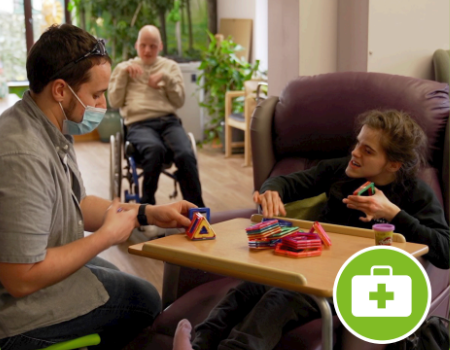Why is this important?
Transforming what we do recognises that some of the improvements we need to make will take some time to deliver, but the benefits will be significant for local people.
Our communities and localities are at the heart of this approach. Delivering care closer to home when it is safe to do so gives people the best opportunity to quickly access the support they need. This supports one of the Government’s 3 shifts in the emerging 10 Year Health Plan, moving care from hospitals to communities – where feasible and safe to do so.
When people do need more specialist support, it should be the right care, delivered at the right time, in the right place.
We also recognise that people are now living with more long-term health and care needs for longer. We want to take a more personalised approach to care, supporting people to remain at home for longer, whilst reducing the need for hospital stays.
We know that people from more deprived communities as well as different population groups can experience varying access to, and experience of, services, as well as differing health outcomes.
The health of our NHS and local people is also dependent on supporting and developing our dedicated and diverse workforce in all parts of the system.
We are working to attract people to come and work in Gloucestershire, encourage young people to stay as well as retain and develop our existing staff through training, education, professional development and career progression.
What have we done?
We have been continuing to develop Integrated Neighbourhood teams in local communities. These are made up of a group of professionals from across primary care, hospital care, community care, mental health services, social care and local charitable and voluntary sector organisations who come together to deliver care for a group of patients within their area. Using a Population Health Management approach, they work to identify people with potential health issues earlier, providing proactive care and support in the community.
For example, health and care teams are using a digital tool to identify people at risk of health deterioration and then providing proactive care to help them live as well as possible.
Through the Working as One programme we have been focused on better joining up and co-ordinating health and care for people and support them to stay healthy, recover quickly following an illness, and ensure that care and treatment are received in the most appropriate place.
And almost 4,000 additional people have been identified as having high blood pressure, allowing for support to be given for them to manage their condition and prevent heart attack and strokes.
Our We Want You team over 2024/25 worked with 19 schools to engage more than 8,000 students and encourage young people to consider a career in health and social care.
Read more about our work on the ground:
- Schools in Gloucestershire Invited to Sign up for New Asthma Safety Initiative
- Elderly patients at Gloucester GP surgery benefitting from specialist frailty care
- Hundreds of men turn out for Gloucestershire prostate awareness and advice clinic
- Bedside eye care is helping prevent avoidable sight loss and supporting older people to live independently for longer
- Health and care organisations embracing T-Levels to nurture future talent
- “Fantastic work” of Respiratory team wins industry award
- New Health and Wellbeing Hub to Serve Inner City Communities in Gloucester
- Community Wellbeing and Fun Days Tackle Isolation and Bring People Together in the Cotswolds
What are we doing next?
Continuing to expand mental health support teams in schools (Young Minds Matter) and develop a multi-agency navigation hub for young people in Gloucester schools.
Working with partners to review ‘intermediate care’, ensuring people have the right support when they leave hospital, allowing them to recover at home or in another community setting when possible.
Proactively supporting people with long term conditions like diabetes, respiratory and heart conditions to better manage their illness.
Continuing to deliver on our commitments in addressing the unfair or avoidable differences in health that people experience across the population– including supporting people with serious mental illness, identifying more people with high blood pressure, and reducing the over reliance on asthma medicines for children with asthma.
Working closely with the University of Gloucestershire to develop the Arts, Health and Wellbeing Centre at the new City Campus in Gloucestershire.


